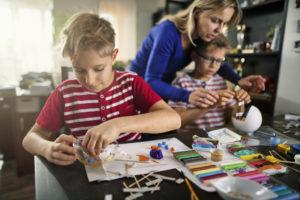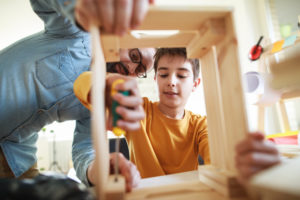Find out if you could be a foster carer
In a few simple questions, you’ll know if you’re suitable to apply to become a foster carer.
Debbie and Alan have been fostering with Fostering Solutions since 2005. From their home in Cheshire, they’ve supported 12 children on a short or long term basis, and they’ve also support 4 children on a respite basis as well. Before fostering, Debbie was supporting young people with acquired brain injuries, and so already had some experience working with young people, and Alan worked in financial services until he retired.
For Debbie, fostering had been something she had thought about since she was very young. “My Dad used to take us to the local children’s home near Delamere in Cheshire each Christmas. We used to save some of our pocket money so we could buy the children a present so they didn’t go without. I knew from a very young age that not all children had a family, and it’s always stayed with me.” When Debbie and Alan first looked into fostering, they had young children living at home. “The first time we considered fostering we realised it wasn’t the right time for us. We’d met a lady at school who was fostering, and started to look into it, but our children were still young and needed us. We also didn’t have a spare room at the time, so couldn’t proceed. I know there are other foster families with young children, but it wasn’t right for us at the time. Once our eldest have left home we had the time and the space to be able to foster, and we saw an advertisement for Fostering Solutions in the local paper. We rang them up, and it all went from there.” For Debbie and Alan, the family feel of the agency was what inspired them to choose Fostering Solutions.
It was always Debbie’s belief to give something back, and although she had to give up her job working with young people with brain injuries, she knew it was the right step. “The assessment process was good, but it’s very in depth. The assessing social worker knows everything about your life, and can leave you feeling a little vulnerable at times, but it’s worth it in the end.” When Debbie and Alan went to panel at the end of their assessment, it was a little daunting. “I was very nervous as, like the assessing social worker, it’s a lot of people knowing your life story. Thinking back, it’s very similar to how our foster children feel. In the end, panel was a positive experience. More like a job interview with a group of people.” It was the first of many for Debbie and Alan, with our carers going back to a local, smaller panel every year thereafter for their annual review.

Debbie and Alan’s first child who came to stay was a young girl aged 7. “From the very start we knew she was coming to stay with us long term. It was a little different to our other children coming to stay as we attended matching meetings, and she came to visit a few times first before she came to our family home permanently. She lived with us until she went off to university when she was 18 and she’s still very much part of the family. She recently finished her degree in Criminology and sent me a photo as she sent off her last assignment. It’s kind of funny really, the girl who could never seem to follow the rules studying Criminal Justice. She’s turned into a lovely young lady.” Debbie and Alan had three babies they took alongside the young girl who stayed with them. “One came straight from hospital and we had him for 10 weeks whilst his grandparents were assessed, another came to us at 8 months with the court processes still ongoing and didn’t leave till he was almost 3 years old. No matter how long they stay for they end up part of the family. We’re still in touch with them almost 14 years later.” The attachments young children form, give them the basis they need to form relationships throughout their life, and maintaining contact with foster children when they move on can help them with this.
Debbie and Alan have been looking after three boys long term for the last 8 years. “When they came to us we didn’t know much. The oldest was 5, and we knew he had autism after being diagnosed at 3. The younger two were both 2 at the time – one had just turned 2 that month, and the other was turning 3 the following month. They all had Global Developmental Delay, but other than that we didn’t know too much until they arrived with us. Over the years, and after seeing many professionals, lots of other difficulties have been identified but the whole family just takes it in our stride. These range from hearing and sight difficulties to chromosome deletions, but this just makes them who they are.” Debbie and Alan know that the smallest moments can often be the most memorable for our foster children. “The biggest memories for us is when they hit milestones. Our youngest can now write his name, or at least what every who knows him knows as his name, and this is a big achievement for him to be able to communicate with his writing. He’s also just achieved his 5m swimming, which for most children might be something small, but for him is amazing. Our middle foster son has had a lot of health issues over the years, and had to have surgery a few times, but he is so brave dealing with it all, and is just amazing. And now his speech is really coming along too which stops him getting frustrated when trying to communicate. Our oldest is always trying new things. To try new things and step out of his comfort zone is a major achievement for him, and we’re so proud when he does.” The memories you have within fostering are often when the children you care for achieve something new. Whether this be going to university like Debbie and Alan’s first foster child, or managing to communicate through speech after having surgery, being there to help them is the most important part.
Fostering is about supporting the children you care for no matter what, and Debbie and Alan teach their children all kinds of new skills. “Our middle child has been helping in the garden recently and with some DIY. He’s absolutely loving it, so for his birthday we brought him some tools of his own that he can use when helping us out. He’s old enough now that we can help him to learn the skills he’ll need when he lives independently.” By teaching them the skills they need for independent living, foster carers can help set the children and young people up for life. From cooking and baking, to helping with the household chores, everything they are taught growing up helps them when they move on.

Fostering has both the high’s and the low’s. “It’s a bit of a rollercoaster really. You can have some day’s that are great, and others that are an absolute nightmare. We were prepared for this from our very first visit with Fostering Solutions. When the social worker first came out to see us, she gave us some of the horror stories so we were prepared. We questioned at the time if we would manage, but it helped us to realise the behaviours the children have shown over the years is normal – these children are in care for a reason and what they do is just a result of what they thought was normal in their early life.” Debbie has had lots of support over the years. “Alan took early retirement to help me when the boys first arrived and we’ve supported them as a team since. We couldn’t have done it without the support of our children, family and friends. We also have a really good relationship with our social worker. She tells it how it is, and when things are difficult it’s exactly what you need to hear. Having speakers at support groups, and the specialist training brought in by Fostering Solutions is also really helpful. Especially when it’s around the needs of the children I’m looking after.”
If you’re looking into fostering, Debbie has some words of advice to help with your first child coming to stay. “Don’t take things personally or beat yourself up. We’re only human. You’ll always look back and say I could have done this differently, or maybe I should have done that but everyone fosters differently just like every family is different. And don’t forget to say sorry to the child if you could have done something differently, that way they learn how to say sorry too.”
For more information on fostering, enquire via the website or give us a call to find out more about fostering in your local area.